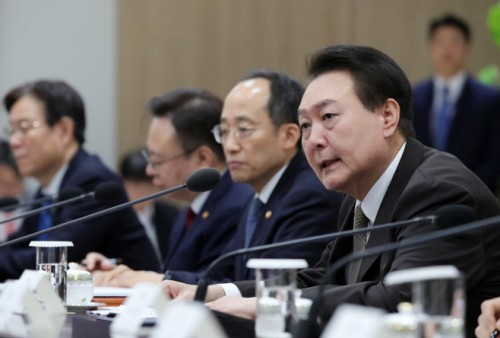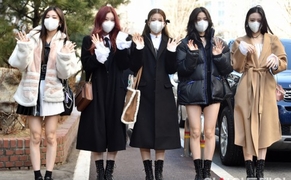 |
| President Yoon Suk-yeol speaks during an emergency economic and public livelihood meeting at the presidential office in Seoul, Feb. 15, 2023./ Source: Yonhap |
AsiaToday reporter Lee Wook-jae
The government has decided to freeze public utility fees in the first half of the year to help ease people’s economic sufferings amid inflation and high interest rates. In addition, it plans to lower energy bills, telecommunication costs and other sectors that are directly related to people’s livelihoods.
“While the growth in consumer prices and interest rates has subsided due to various policy efforts, ordinary citizens and the socially vulnerable are still struggling,” President Yoon Suk-yeol said during an emergency economic and public livelihood meeting held on Wednesday. “A rise in heating bills and scheduled hikes in public utility fees are adding to the public’s burden,” he said.
“The government will prioritize people’s livelihoods in all policy matters,” the president said.
The government expects consumer price growth to continue for the time being, although it gradually slowed to 5.2 percent in January from 6.3 percent in July last year. The rise in public utility fees such as transportation fees and rising heating costs due to rising electricity and gas fees are adding to the difficulties of ordinary citizens.
As a result, the government has decided to freeze railroad, postal and other pubic utility fees in the first half of the year. Local governments will be given financial incentives if they refrain from raising public utility charges. The government said 44 local governments have confirmed the freeze and postponement of public utility fees so far, and 10 more local governments are pushing for the freeze and postponement. The Seoul city government, which has been pushing to increase its subway and bus fares starting in April, put off its plan to the second half of this year.
The government will also provide 592,000 won worth of energy costs to the socially vulnerable who use kerosene and liquefied petroleum gas (LPG). The installment payment of energy fares, which is only applied to basic living recipients and the next upper class, will be expanded to small business owners.
In addition, the government will expand support of affordable transportation cards to ease the burden of transportation costs for ordinary citizen.
#freeze #public utility fees
Copyright by Asiatoday
Most Read
-
1
-
2
-
3
-
4
-
5
-
6
-
7





















